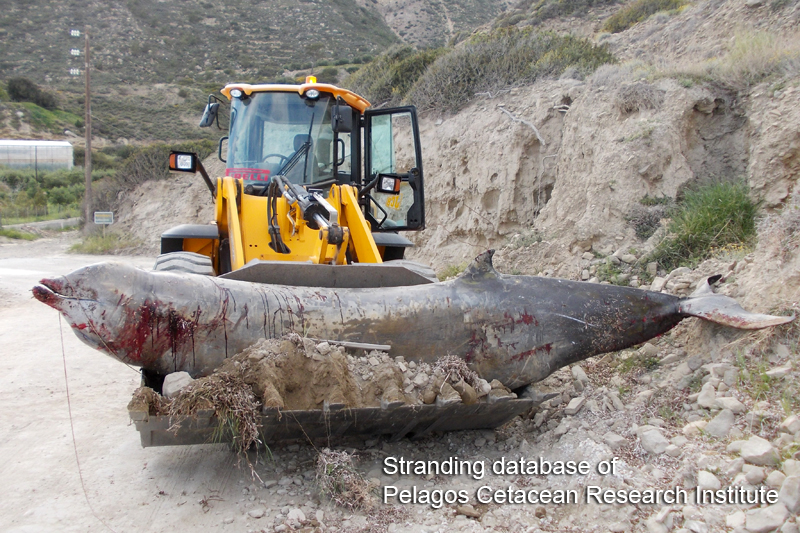
New Whale Stranding Is Painful Evidence for Naval Sonar Risks (Op-Ed)

Michael Jasny is director of the NRDC Marine Mammal Project. This Op-Ed was adapted from one that appeared on the NRDC blog Switchboard. Jasny contributed this article to Live Science's Expert Voices: Op-Ed & Insights.
On April 1, while the U.S. and other navies played war games somewhere offshore, Cuvier's beaked whales began stranding along the southern coast of Crete. Those on the scene knew right away what they were dealing with, for the strandings were only the most recent in a line of similar calamities in the region, going back two decades. And in this case, as in the previous ones, all signs pointed to the U.S. Navy and its allies.
Cuvier's beaked whales are a remarkable species. They have the deepest recorded dives of all marine mammals, some descending an astonishing 9,500 feet (3,000 meters) below the water's surface before coming up for air. Favoring deep water, they don't strand nearly as often as coastal species, and they don't strand in large numbers, and they don't strand alive.
Yet, that is exactly what happened on April 1. Beginning around noon, three Cuvier's beaked whales came ashore in one spot along the Cretan coast, two others beached some 10.5 miles (17 kilometers) further west, and two more turned up another mile or two from there. All were alive when they stranded; rescuers managed to return most to the water, but, based on past experience, biologists in the region fear that they stranded again or perished at sea.
For Greece, none of this is new. In 1996 and again in 1997, dozens of beaked whales of the same species turned up along the Peloponnesian coast; in 2011, they stranded on the island of Corfu as well as the east coast of Italy, across the Ionian Sea. In each case,navies were training with high-powered sonar in the area. Indeed, according to the Smithsonian Institution and International Whaling Commission, every multi-species beaked-whale mass stranding on record everywhere in the world has occurred with naval activities, usually sonar exercises, taking place in the vicinity.
For the last week, the U.S., Greek and Israeli navies have been running a joint military exercise off Crete known as Operation Noble Dina. The exercise includes anti-submarine warfare training, which requires the use of high-powered military sonar.
Each of these events is tragic in its way, but this one feels particularly cruel. Just last year, the Scientific Committee of the Agreement for the Conservation of Cetaceans in the Black and Mediterranean Seas (ACCOBAMS), drew a map where sonar training should be avoided. One area on the map is off southeastern Crete — exactly where the new mass stranding occurred — around a highly sensitive marine area known as the Hellenic trench. But Greece fought the recommendation, and it wasn't adopted.
Get the world’s most fascinating discoveries delivered straight to your inbox.
Now experts are despairing that, with stranding after stranding, the region's beaked whale populations are being decimated.
Beaked whales that have died from sonar exposure — at least the ones recovered in time for investigation — have suffered from a suite of severe, telltale pathologies, similar to those seen in decompression sickness, or the bends. Sonar is believed to kill them by disrupting their dive patterns. The ones that reach shore are considered the tip of an iceberg. [Military Sonar May Hurt Blue Whales]
Stranding responders, including Alexandros Frantzis, the Scientific Director of the Pelagos Cetacean Research Institute, have asked the Greek authorities to intervene so that military sonar will not be used in the area in the days ahead. The same urgent request must be made of the U.S. Navy, which appears to have participated in this exercise without undergoing environmental review under the Marine Mammal Protection Act or Endangered Species Act.
This event, and others like it, keep driving home a simple fact: Military sonar and marine mammals don't mix. How many more whales must die before navies agree to avoid important and vulnerable marine mammal habitat, like the area identified off Crete? When the principals continue to operate as they have in this instance, they approach something like reckless indifference, like barrelling a truck down a crowded city street. Our oceans are large enough to accommodate whales and military training, if our navies had the will to do the right thing.
Jasny's most recent Op-Ed was "Groups Sue Feds to Protect Blue Whales and Dolphins Off California." This Op-Ed was adapted from "U.S. Navy Implicated in New Mass Stranding of Whales" on the NRDC blog Switchboard. The views expressed are those of the author and do not necessarily reflect the views of the publisher. This article was originally published on Live Science.
 Live Science Plus
Live Science Plus





